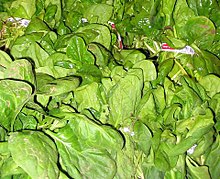اسفناج
Persian
[edit]Alternative forms
[edit]- سپاناج (sepânâj), اسپاناج (espânâj), سپناج (sepanâj), اسپناج (espanâj), اسپانج (espânaj), اسپنانج (espanânaj), سفاناج (sefânâj), اسفاناج (esfânâj), سپاناخ (sepânâx), اسپاناخ (espânâx), اسپناخ (espanâx), سپناخ (sepanâx), اسپناخ (espanâx), اسپانخ (espânax), سفاناخ (sefânâx), اسفاناخ (esfânâx), اسفناخ (esfanâx), اسباناخ (esbânâx), اسبناخ (esbenâx), سبانخ (sabânax), سبانج (sebânaj), اسبانج (esbânaj), اسبناج (esbanâj), اسپاناغ (espânâğ), اسپناغ (espanâğ)
Etymology
[edit]Kulturwort of Iranian origin. According to Asatrian, there were probably two forms in late Middle Iranian, *ispanāg (or *ispināg) and (the dialectal) *ispanāx (or *ispināx), yielding Arabized forms إِسْفَنَاج / إِسْفِنَاج (ʔisfanāj / ʔisfināj) and إِسْفَنَاخ / إِسْفِنَاخ (ʔisfanāḵ / ʔisfināḵ), which were popularized in Persian and Arabic, respectively (alternative forms with پ (p) are directly from Middle Iranian). The Old Iranian form would be *spināka-, *spinaka- (compare Northern Kurdish sping), from the root *spin- (Northwestern Iranian), *sin- (Southwestern Iranian), ultimately from the Proto-Iranian *spai- (*spi-), from Proto-Indo-European *spey- (“thorn-like”) (*spi-), which are also reflected in Latin spina, Persian سنجد (senjed), Ossetian сындз (synʒ), синдзӕ (sinʒæ, “thorn”), Baluchi [script needed] (šinž), Central Iranian šeng, Kermani šank (“thorn”). Also akin to Semnani esbenāγa.
According to Cabolov, related to Northern Kurdish siping (“meadow salsify, possibly also spinach”) and Persian سپند (sepand, “wild rue”).

Pronunciation
[edit]- (Classical Persian) IPA(key): [ʔis.fi.nɑːd͡ʒ]
- (Iran, formal) IPA(key): [ʔes.fe.nɒːd͡ʒ̥]
- (Tajik, formal) IPA(key): [ʔis.fi.nɔd͡ʒ]
| Readings | |
|---|---|
| Classical reading? | isfināj |
| Dari reading? | isfināj |
| Iranian reading? | esfenâj |
| Tajik reading? | isfinoj |
Noun
[edit]اسفناج • (esfanâj, esfenâj) (plural اسفناجها (esfanâj, esfenâj-hâ))
- spinach
- Synonym: شومین (šumin, šomin)
- 1258, Rumi, Masnavi, First Book:
- من سپاناخ تو با هرچم پزی
یا ترشبا یا که شیرین میسزی- man sipānāx tō bā harčam pazī
yā turš-bā yā ka šīrīn mī-sazī - (please add an English translation of this quotation)
- man sipānāx tō bā harčam pazī
Descendants
[edit]Most are directly from Middle Iranian
- → Arabic: سَبَانِخ (sabāniḵ), إِسْفَانَاخ (ʔisfānāḵ), إِسْفَنَاخ (ʔisfanāḵ), إِسْفَنَاج (ʔisfanāj), إِسْفَانَاج (ʔisfānāj), سَبَانَغ (sabānaḡ), سَبَانَج (sabānaj)
- Andalusian Arabic: إِسْفِنَاج (isfināj), إِسْبِنَاج (isbināj), إِسْبِنَاخ (isbināḵ)
- → Aragonese: espinai
- → Catalan: espinac
- → Occitan: espinac, espinarc (influenced by french)
- → Portuguese: espinafre
- → Spanish: espinaca
- → Medieval Latin: spinacium, spinachium, spinarchia (influenced by spina (“thorn”))
- Andalusian Arabic: إِسْفِنَاج (isfināj), إِسْبِنَاج (isbināj), إِسْبِنَاخ (isbināḵ)
- → Georgian: ისპანახი (isṗanaxi)
- → Middle Armenian: սպանախ (spanax), ասպանախ (aspanax), սպաննախ (spannax)
- Armenian: սպանախ (spanax)
- → Ottoman Turkish: اسفناج (isfinâj), اسپناخ (ispenâh), اسفاناخ (isfânâh)
- → Turkic:
References
[edit]- Dehkhoda, Ali-Akbar (1931–) “اسفناج”, in Dehkhoda Dictionary Institute, editors, Dehkhoda Dictionary (in Persian), Tehran: University of Tehran Press
- Asatrian, Garnik (2011) A Comparative Vocabulary of Central Iranian Dialects[1] (in Persian), Tehran: Safir Ardehal Publications, pages 43–45
- Steingass, Francis Joseph (1892) “اسپناج”, in A Comprehensive Persian–English dictionary, London: Routledge & K. Paul
- Lokotsch, Karl (1927) Etymologisches Wörterbuch der europäischen Wörter orientalischen Ursprungs (in German), Heidelberg: Carl Winter’s Universitätsbuchhandlung, § 126, page 11
- Cabolov, R. L. (2010) “siping”, in Etimologičeskij slovarʹ kurdskovo jazyka [Etymological Dictionary of the Kurdish Language] (in Russian), volume II, Moscow: Russian Academy Press Vostochnaya Literatura, page 263
- Redhouse, J. W. (1884) “spinach”, in A Lexicon, English and Turkish, 3rd edition, Constantinople: A. H. Boyajian, page 703
- Redhouse, J. W., Wells, Charles (1880) “spinach”, in Redhouse's Turkish Dictionary, in Two Parts, English and Turkish, and Turkish and English, 2nd edition, London: Bernard Quartch, 15 Piccadilly, page 306
- Abajev, V. I. (1979) Историко-этимологический словарь осетинского языка [Historical-Etymological Dictionary of the Ossetian Language] (in Russian), volume III, Moscow and Leningrad: Academy Press, pages 201–202
- Persian terms derived from Iranian languages
- Persian terms derived from Middle Iranian languages
- Persian terms derived from Old Iranian languages
- Persian terms derived from Proto-Iranian
- Persian terms derived from Proto-Indo-European
- Persian terms with IPA pronunciation
- Persian lemmas
- Persian nouns
- Persian terms with quotations
- fa:Amaranths and goosefoots
- fa:Vegetables
